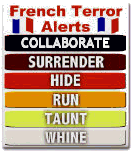A relative of mine recently told me of some thoughts of his on future driving. It turned into a mini debate on the merits and feasibility of his vision versus what I thought would or wouldn’t work. I shouldn’t be such an “old fogey” in those debates. I am somewhat skeptical of some of the points of his vision, but I should attempt to frame them more as improvements on his plan.
Perhaps I can articulate it better in writing (I usually can) the sort of things I have in mind.
My relative’s opinion is that the future of driving is one of the cars being controlled by a satellite computer network. These satellites will give the car information about the road, the cars around them, and give them their instructions on how to drive, operating sort of like air traffic control for planes. The cars, thus coordinated, would travel without human intervention, be able to sustain higher speeds without accident, and would never have accidents due to human error again. In his opinion, it’s safer for the cars to operate without the human having the ability to control the car than with due to the ability of modern programs to handle the information given to them. People are idiots. They get into accidents, their attention wanes, they drive drunk, they talk on the cellphone when they should be paying attention to the road, they ride people's trunks.
In my opinion, there certainly may be a role for computer control of cars, but some parts of his vision could work better if approached with a different philosophy. First of all, air traffic control, IMO, has a lot to learn from the way roads are operated than the other way around! Air traffic control deals with maybe 5000 aircraft over the sky of the entire United States at a time. It coordinates their movements, and directs their altitudes. However, aircraft can operate at many altitudes without terrain considerations at all. The problem of directing aircraft is simple compared with directing automobiles. And our skies are considered crowded! In contrast, there are 200 million vehicles operating in the United States. They all operate every day. They all pour out onto the road during rush hour, and they all have a very specific individual destination in mind (as opposed to a relative handful of airports). Each of these vehicles must navigate construction zones, other impassable vehicles at (comparatively) immensely close proximity, impassable barriers, unexpected obstacles (kids, bicycles, pipes sticking up out of the road for no apparent reason, pedestrians, storm debris). Each of these vehicles manages it every day without any coordination at all. The reason why they can perform what would be a monstrous command and control nightmare to dwarf by several orders of magnitude the air traffic control problem without any grand central traffic cop, is because every car operates according to some simple and mutually held road rules. This may sound trivial, but it’s not. The cars concern themselves with their immediate situation. They encounter localized road situations (intersections, merging, ect), and operate autonomously according to predefined rules (the cars going straight have to go before the cars turning left can go, turns yield to through traffic). This enables an arbitrary number of cars to proceed through their day to day business without burdening central control at all with an extra vehicle to maneuver. The amount of communication necessary to navigate the car drops. Each car is responsible for it’s own computation. This enables vehicles to operate locally and autonomously, rather than concerning themselves with the global traffic situation and being confined by it.
The cars on the road right now don’t need to communicate with a centralized network. The range, number, and volume of their communications is far less than what would be required for centralized control. As it is now, the vehicles only need to send and receive information to the cars immediately surrounding them. 200 million vehicles, all talking at the same time to the same computer system that’s trying to direct them, wouldn’t work out so well. 200 million computers can talk to the internet, because they’re each talking to an individual server, each requesting independent operations. The traffic control problem would need to be solved in such a localized manner, rather than all together as a coupled problem. With localized control, the cars could serve with their own computing power, rather than needing a super-supercomputer in each city to mange it.
The third nit-pick that bothered me is that the cars are all talking to a network to get their information about the world. Supposedly the network contains all the information the car needs to know about the world. If the car gets it’s worldview from the network, where does the network get it’s worldview? What happens when a storm blows through and puts a branch in the middle of the road? What happens when the road crew takes out your overpass without informing the network? (Visions of cars cascading over the side of a cliff) What happens in the inevitable accident when the car fails? (And the cars will fail. The system has to be tolerant of mechanical failure as well as lack of information). How will this network handle a kid running across the street, or a deer bounding across the highway? The network is not the world. I don’t think it should ever be taken as a substitute for the world. If cars have the capacity to operate themselves, they need to demonstrate it by reacting to the world as it is, not the world as a network thinks it is. They need to take in the immediate, local sensory information on the ground and process that, because a glorified road map will never have information to that detail. It just won’t have the sheer level of sensory capacity for it. Even if it does, it’s more effective to just stick the necessary sensors on the cars anyway. This ensures the senses are where the car is, and that the cars can handle non-upgraded roads as well as high-tech modernized roads.
My fourth nit-pick is that this system needs to be tolerant of drivers that aren’t operating on the central-control method. It needs to be able to be gradually phased in. You aren’t going to replace 200 million vehicles, or the highways, in a massive sweeping movement. You’re not going to be able to ground all the cars in the country until they are all equipped with robotic control systems. Your car has to be tolerant of idiot drivers anyways, even if your opinion is that people are too clumsy to operate a car, because it’s not going to have a road clear of all vehicles but ones operating according to the central control. Localized autonomous control of vehicles is so much more robust and requires so much less effort than a centralized control network. IMO, this is the way to go. If your car is autonomous, it should be able to handle what any driver can handle. This is so much more robust.
Final nit-pick – humans
have demonstrated the capacity to operate their vehicles just fine. Robots haven’t demonstrated the capacity to operate in the real world to that degree yet (though I don’t doubt that they will be capable eventually). “People are idiots”, may apply, but
even idiots are
incredibly aware of their situation compared to the most decked out robots. Furthermore, people can gain an
understanding of their situation to a degree that a program may not. I’m not saying that people should always grab manual control I’m saying that they should
always have that option.
Always. On any device that they are operating. Because the people maybe, maybe, just know something about what is going on in a particular scenario (esp. in particularly dangerous, unusual ones) that their programs don’t. A programmer in an office building may be able to take an impressive number of scenarios and situations into account, and may be able to develop some very nimble and responsive algorithms, but they aren’t there looking at the problem, on the scene. The whole point of having these vehicles and machines in the first place, is to get them to do what
we need them to do, not what their manufacturer thinks we should do with them. They are tools for the use of the
user, not the designers, and ultimately, the user should have control.
Okay, so that was more of a debate. But I still think these principles are more sound and robust than the ones laid out in the original vision of air-traffic-controlled vehicles.


